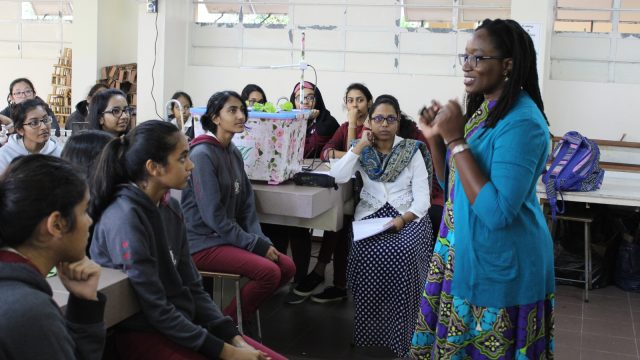How soon after they start school should African youth be taught about entrepreneurship?
Junior Achievement Africa CEO Elizabeth Bintliff (pictured above) says young Africans are not getting access to skills that will enable them to become entrepreneurs early enough.
No ad to show here.
“Most business education starts at tertiary education level and less than 10% of Africa’s youth go on to access university education.
“The vast majority of youth will have to create their own employment because the jobs are simply not available, so we need to start training them young,” says Bintliff.
She adds that most young people need help with the fundamentals, especially questions like “who is an entrepreneur”.
Bintliff won Anzisha’s 2019 Very Young Supporters Award
“They need to understand that entrepreneurs are not just foreigners in Europe and America. They also need to be supported by their parents.
“They need to be able to identify business opportunities in their communities, then know how to turn them into viable and marketable products or services,” she says.
Bintliff is one of the four recipients of Anzisha’s 2019 Very Young Supporters Award.
The other recipients were Springfield Convent accounting and business studies teacher and head of entrepreneurship Kirsty Tromp, Cape Town incubator RLabs and Africa Leadership Academy enterprise board member and mentor Naledi Rasekoala.
Junior Achievement Africa, Bintliff explains, focuses on the “economic empowerment” of the continent’s youth.
The Ghana-based organisation focuses on entrepreneurship education, work readiness and financial literacy.
Junior Achievement Africa teaches young people how to create jobs for themselves as entrepreneurs, how to access the few jobs that exist and how to add value to their employers, as well as how to earn and manage money.
Bintliff points out that the organisation works to bridge the gap between what youth learn in school and what they need to know to be successful professionals.
“We believe that it’s important for Africa’s youth to be familiar and comfortable with entrepreneurship at a young age before they become risk averse and attached to more traditional jobs,” she adds.
‘Entrepreneurship should be part of primary school’
Bintliff believes entrepreneurship should be “mainstreamed” in the curricula at both primary and secondary school levels.
And teachers, she adds, should be taught how to teach entrepreneurship, and be rewarded for teaching it.
“Instead of students all looking forward to the teacher, they should all be looking inward towards each other and be encouraged to exchange ideas, debate in class, ideate, collaborate, brainstorm and otherwise build the skills that are so fundamental to successful entrepreneurship,” she says.
Parents too, she adds, have a key role to play.
Bintliff says parents who have their own businesses — whether these be small tuck shops or medium to large enterprises — should be invited to speak to schools and celebrated in the communities.
“We need to normalise entrepreneurship for youth in Africa and make it more accessible,” she says.
‘Mentorship a fundamental asset’
Bintliff points out that mentorship is “one of the most fundamental assets” when someone is starting out as an entrepreneur.
She says it’s critical that those starting out be be able to access encouragement, mentorship, coaching and advice from others who have “walked the path”.
“They can guide them on decision making and direction, direct them away from pitfall and give them practical advice on things like accessing credit and registering businesses to creating boards and managing investors,” says Bintliff.
Her advice to other entrepreneurs, professionals and those in the private sector interested in supporting young entrepreneurs?
“Just do it. Our economies in Africa are so heavily dependent on small business owners creating value, especially when it comes to employment.
“From the women who dominate our marketplaces to the shops that line our streets and everything in between, it is the entrepreneurial spirit of people that drive this continent. These entrepreneurs need all the help they can get,” she says.
Bintliff says one of the things she asks herself on a daily basis is whether she’d have used a product made in Africa.
“I try as much as possible to buy African. That too makes a huge difference to our entrepreneurs who are often competing with large, multinational conglomerates.
Says Bintliff: “We can all contribute to the movement of creating successful entrepreneurs in Africa”.
This story appeared originally on Ventureburn and the Anzisha Prize’s blog on 25 September. See it here.
The Anzisha Prize seeks to fundamentally and significantly increase the number of job generative entrepreneurs in Africa, and is a partnership between African Leadership Academy and Mastercard Foundation. Through Ventureburn, they hope to share inspirational and relatable stories of very young (15 to 22 year old) African entrepreneurs and the people that support them. [learn more]
Featured image: Junior Achievement Africa CEO Elizabeth Bintliff speaking to young students of her organisation’s entrepreneurship programmes in Mauritius (Supplied)
